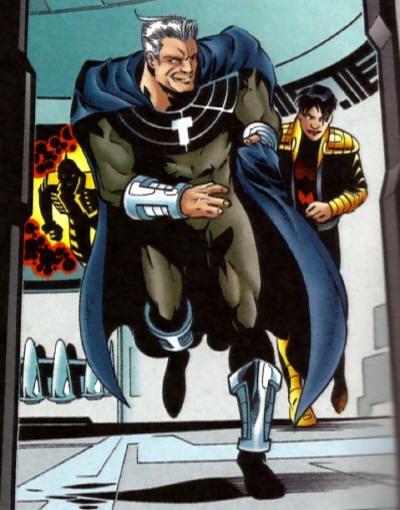
Mindboggling as it is to me, major villains veteran to numerous run-ins with the Sleuth from Outer Space lack poll support. Meanwhile, the poor man's Sinestro, who could be considered a lesser Green Lantern Kyle Rayner foe (behind the lightweight likes of Fatality, the sons of Darkseid, the junior Mongul, an evil version of Hal Jordan and Captain Atom loaner Major Force) who only ever fought J'Onn J'Onzz as part of a
Love Boat collection of bad guy guest stars (
Salvation Run, Final Crisis) has a reasonably strong mandate. Effigy took 62% of 13 votes, but consider yourselves chastised.
Zero Hour was conceived as a soft reboot of the DC Universe that would explain away problematic chunks of continuity that hung on after their more pronounced but staggered and divisive new beginning point,
Crisis On Infinite Earths. The history of the Justice League of America was pretty screwed-up by this approach, since Superman, Batman, and Wonder Woman were all retroactively removed from membership, Hawkman was turned into two different guys from the one that had served in the comics, Black Canary was made a founder, and the Martian Manhunter never once left the group. They could, and eventually did, devote an entire maxi-series just to handling the team dynamic that came out of those changes. In the meantime,
Zero Hour was a weekly event mini-series that demanded all DC Comics have a tie-in issue one month, and a reader friendly entry point #0 issue the following month.

The three JLA titles had just done a self-contained event story, "Judgment Day," that was intended to finally bring a blessed end to the International era of branches governed by the United Nations in America, Europe, and the special missions Task Force of temporary recruits. "Zero Month" saw the core U.S. team continue to be led by Wonder Woman as a halfway home for revised heroes like Hawkman, '80s leftovers from Infinity Inc., and female JLI members with nowhere else to go. By design, it was the inclusionist, namby-pamby liberal League. Captain Atom would lead Extreme Justice, the Chromium Age militant unit complete with bad art involving lots of screaming and shiny metal. The Task Force was reworked as classic X-Men/New Mutants, with a reserved mentalist guiding young charges in the art of heroing-up. The new approaches would launch with #0, while "Judgment Day" was already done, so the editors had to come up with a gimmick to float the titles for the lag month that also had to invent a continuity glitch to tie into
Zero Hour without touching on any of the heroes who had issues to work through in their own books.

Hence Triumph, a hero invented by committee to solve a temporary problem before lingering indefinitely. In the early days of DC's Modern Heroic Age, William MacIntyre was a young turk on the costume scene who put together a team of heroes nearly identical to the founding Justice League line-up(s). While battling the big alien menace, Triumph and the extraterrestrial invaders became dislodged in time, forgotten by history, only to resurface during the "Crisis in Time." Triumph tried to rally the heroes of the fractured League, but had to overcome his suspicious history and off-putting personality. The introduction and set-up meant that the alien menace was rather lame and easily dispatched in one issue, minimizing Triumph's ordeal. Finally, what could have been a well-loved dabbling in one-off pathos that won Kurt Busiek awards for his
Astro City story "The Nearness Of You" and keeps the memory of Tomorrow Woman alive was undone by William MacIntyre sticking around as a permanent addition to the DC Universe. Rather than a hero who sacrificed himself to the greater good, Triumph was a griper who screwed up continuity and acted as an equal to the founding Leaguers without earning that regard in hundreds of stories, as they had.

Triumph was never believable as as Silver Age implant, with a costume that was much too simple and of a hue likely impossible to replicate via the old school four color process. Electromagnetic abilities are passé now, but who rolled that way under Eisenhower, at least not without throwing in some quaint pseudoscientific jargon? Nobody had all those random hunks of pointy metal on their unitards back in the day, while Triumph's overwrought story and overheated attitude were pure Bronze Age.
Fans and creators took an immediate and intense dislike of the character, which writer Christopher Priest smartly turned to his advantage by making him the "mixer" of the JLTF: conniving, arrogant and outspoken. Where that was played successfully for comedic value with the fan favorite Guy Gardner, readers instead were irritated by Triumph, and relished his headbutting and eventual beating at the hands of the Martian Manhunter.

J'Onn J'Onzz fired Triumph from the League that he sorta-kinda created, refused to allow Will back once rejoining became Triumph's sole mission in life, and contributed to Will losing his soul to the demon Neron, turning full-on League villain as part of Morrison's
JLA. When looked at objectively, the Martian Manhunter was an antagonist who ruined Triumph's chances for redemption and drove him to ruin. Despite being driven more by narcissism/self-actualization than altruism, Triumph was still a good enough guy who was stymied by an uncharacteristically intractable Alien Atlas and eventually corrupted by his inability to recover from the consequences of that insult. In Triumph's story, the Martian Manhunter is the bad guy, which is a great starting point for a grand conflict.

J'Onn J'Onzz's story is that of the quiet, grateful but still somewhat critical immigrant who assimilates dutifully and contributes to society. William MacIntyre's story is of an entitled a-type who is simultaneously more and less than human, whose best works are more of a side effect than a true concern. At the same time, both are men with deep, dark secrets that set them apart from their peers. Triumph, for instance, was born from villainy and a closeted homosexual. Despite Marvel's running wild with the exact same character template under the guise of the Sentry, Triumph's back story and relationship to the League keep him unique and viable as more than an editorial construct. If the Martian Manhunter was the heart and soul of the Justice League for decades, Triumph was the prostate cancer that surfaced after years of self-abuse. Triumph was the quasi-righteous anger of Pete Best and Stuart Sutcliffe. In some ways, he's a perfect match for the Martian Marvel, a worthy, not-quite-sympathetic member of the one collective he wholeheartedly deserves, the Vile Menagerie...

 Mindboggling as it is to me, major villains veteran to numerous run-ins with the Sleuth from Outer Space lack poll support. Meanwhile, the poor man's Sinestro, who could be considered a lesser Green Lantern Kyle Rayner foe (behind the lightweight likes of Fatality, the sons of Darkseid, the junior Mongul, an evil version of Hal Jordan and Captain Atom loaner Major Force) who only ever fought J'Onn J'Onzz as part of a Love Boat collection of bad guy guest stars (Salvation Run, Final Crisis) has a reasonably strong mandate. Effigy took 62% of 13 votes, but consider yourselves chastised.
Zero Hour was conceived as a soft reboot of the DC Universe that would explain away problematic chunks of continuity that hung on after their more pronounced but staggered and divisive new beginning point, Crisis On Infinite Earths. The history of the Justice League of America was pretty screwed-up by this approach, since Superman, Batman, and Wonder Woman were all retroactively removed from membership, Hawkman was turned into two different guys from the one that had served in the comics, Black Canary was made a founder, and the Martian Manhunter never once left the group. They could, and eventually did, devote an entire maxi-series just to handling the team dynamic that came out of those changes. In the meantime, Zero Hour was a weekly event mini-series that demanded all DC Comics have a tie-in issue one month, and a reader friendly entry point #0 issue the following month.
Mindboggling as it is to me, major villains veteran to numerous run-ins with the Sleuth from Outer Space lack poll support. Meanwhile, the poor man's Sinestro, who could be considered a lesser Green Lantern Kyle Rayner foe (behind the lightweight likes of Fatality, the sons of Darkseid, the junior Mongul, an evil version of Hal Jordan and Captain Atom loaner Major Force) who only ever fought J'Onn J'Onzz as part of a Love Boat collection of bad guy guest stars (Salvation Run, Final Crisis) has a reasonably strong mandate. Effigy took 62% of 13 votes, but consider yourselves chastised.
Zero Hour was conceived as a soft reboot of the DC Universe that would explain away problematic chunks of continuity that hung on after their more pronounced but staggered and divisive new beginning point, Crisis On Infinite Earths. The history of the Justice League of America was pretty screwed-up by this approach, since Superman, Batman, and Wonder Woman were all retroactively removed from membership, Hawkman was turned into two different guys from the one that had served in the comics, Black Canary was made a founder, and the Martian Manhunter never once left the group. They could, and eventually did, devote an entire maxi-series just to handling the team dynamic that came out of those changes. In the meantime, Zero Hour was a weekly event mini-series that demanded all DC Comics have a tie-in issue one month, and a reader friendly entry point #0 issue the following month.
 The three JLA titles had just done a self-contained event story, "Judgment Day," that was intended to finally bring a blessed end to the International era of branches governed by the United Nations in America, Europe, and the special missions Task Force of temporary recruits. "Zero Month" saw the core U.S. team continue to be led by Wonder Woman as a halfway home for revised heroes like Hawkman, '80s leftovers from Infinity Inc., and female JLI members with nowhere else to go. By design, it was the inclusionist, namby-pamby liberal League. Captain Atom would lead Extreme Justice, the Chromium Age militant unit complete with bad art involving lots of screaming and shiny metal. The Task Force was reworked as classic X-Men/New Mutants, with a reserved mentalist guiding young charges in the art of heroing-up. The new approaches would launch with #0, while "Judgment Day" was already done, so the editors had to come up with a gimmick to float the titles for the lag month that also had to invent a continuity glitch to tie into Zero Hour without touching on any of the heroes who had issues to work through in their own books.
The three JLA titles had just done a self-contained event story, "Judgment Day," that was intended to finally bring a blessed end to the International era of branches governed by the United Nations in America, Europe, and the special missions Task Force of temporary recruits. "Zero Month" saw the core U.S. team continue to be led by Wonder Woman as a halfway home for revised heroes like Hawkman, '80s leftovers from Infinity Inc., and female JLI members with nowhere else to go. By design, it was the inclusionist, namby-pamby liberal League. Captain Atom would lead Extreme Justice, the Chromium Age militant unit complete with bad art involving lots of screaming and shiny metal. The Task Force was reworked as classic X-Men/New Mutants, with a reserved mentalist guiding young charges in the art of heroing-up. The new approaches would launch with #0, while "Judgment Day" was already done, so the editors had to come up with a gimmick to float the titles for the lag month that also had to invent a continuity glitch to tie into Zero Hour without touching on any of the heroes who had issues to work through in their own books.
 Hence Triumph, a hero invented by committee to solve a temporary problem before lingering indefinitely. In the early days of DC's Modern Heroic Age, William MacIntyre was a young turk on the costume scene who put together a team of heroes nearly identical to the founding Justice League line-up(s). While battling the big alien menace, Triumph and the extraterrestrial invaders became dislodged in time, forgotten by history, only to resurface during the "Crisis in Time." Triumph tried to rally the heroes of the fractured League, but had to overcome his suspicious history and off-putting personality. The introduction and set-up meant that the alien menace was rather lame and easily dispatched in one issue, minimizing Triumph's ordeal. Finally, what could have been a well-loved dabbling in one-off pathos that won Kurt Busiek awards for his Astro City story "The Nearness Of You" and keeps the memory of Tomorrow Woman alive was undone by William MacIntyre sticking around as a permanent addition to the DC Universe. Rather than a hero who sacrificed himself to the greater good, Triumph was a griper who screwed up continuity and acted as an equal to the founding Leaguers without earning that regard in hundreds of stories, as they had.
Hence Triumph, a hero invented by committee to solve a temporary problem before lingering indefinitely. In the early days of DC's Modern Heroic Age, William MacIntyre was a young turk on the costume scene who put together a team of heroes nearly identical to the founding Justice League line-up(s). While battling the big alien menace, Triumph and the extraterrestrial invaders became dislodged in time, forgotten by history, only to resurface during the "Crisis in Time." Triumph tried to rally the heroes of the fractured League, but had to overcome his suspicious history and off-putting personality. The introduction and set-up meant that the alien menace was rather lame and easily dispatched in one issue, minimizing Triumph's ordeal. Finally, what could have been a well-loved dabbling in one-off pathos that won Kurt Busiek awards for his Astro City story "The Nearness Of You" and keeps the memory of Tomorrow Woman alive was undone by William MacIntyre sticking around as a permanent addition to the DC Universe. Rather than a hero who sacrificed himself to the greater good, Triumph was a griper who screwed up continuity and acted as an equal to the founding Leaguers without earning that regard in hundreds of stories, as they had.
 Triumph was never believable as as Silver Age implant, with a costume that was much too simple and of a hue likely impossible to replicate via the old school four color process. Electromagnetic abilities are passé now, but who rolled that way under Eisenhower, at least not without throwing in some quaint pseudoscientific jargon? Nobody had all those random hunks of pointy metal on their unitards back in the day, while Triumph's overwrought story and overheated attitude were pure Bronze Age.
Fans and creators took an immediate and intense dislike of the character, which writer Christopher Priest smartly turned to his advantage by making him the "mixer" of the JLTF: conniving, arrogant and outspoken. Where that was played successfully for comedic value with the fan favorite Guy Gardner, readers instead were irritated by Triumph, and relished his headbutting and eventual beating at the hands of the Martian Manhunter.
Triumph was never believable as as Silver Age implant, with a costume that was much too simple and of a hue likely impossible to replicate via the old school four color process. Electromagnetic abilities are passé now, but who rolled that way under Eisenhower, at least not without throwing in some quaint pseudoscientific jargon? Nobody had all those random hunks of pointy metal on their unitards back in the day, while Triumph's overwrought story and overheated attitude were pure Bronze Age.
Fans and creators took an immediate and intense dislike of the character, which writer Christopher Priest smartly turned to his advantage by making him the "mixer" of the JLTF: conniving, arrogant and outspoken. Where that was played successfully for comedic value with the fan favorite Guy Gardner, readers instead were irritated by Triumph, and relished his headbutting and eventual beating at the hands of the Martian Manhunter.
 J'Onn J'Onzz fired Triumph from the League that he sorta-kinda created, refused to allow Will back once rejoining became Triumph's sole mission in life, and contributed to Will losing his soul to the demon Neron, turning full-on League villain as part of Morrison's JLA. When looked at objectively, the Martian Manhunter was an antagonist who ruined Triumph's chances for redemption and drove him to ruin. Despite being driven more by narcissism/self-actualization than altruism, Triumph was still a good enough guy who was stymied by an uncharacteristically intractable Alien Atlas and eventually corrupted by his inability to recover from the consequences of that insult. In Triumph's story, the Martian Manhunter is the bad guy, which is a great starting point for a grand conflict.
J'Onn J'Onzz fired Triumph from the League that he sorta-kinda created, refused to allow Will back once rejoining became Triumph's sole mission in life, and contributed to Will losing his soul to the demon Neron, turning full-on League villain as part of Morrison's JLA. When looked at objectively, the Martian Manhunter was an antagonist who ruined Triumph's chances for redemption and drove him to ruin. Despite being driven more by narcissism/self-actualization than altruism, Triumph was still a good enough guy who was stymied by an uncharacteristically intractable Alien Atlas and eventually corrupted by his inability to recover from the consequences of that insult. In Triumph's story, the Martian Manhunter is the bad guy, which is a great starting point for a grand conflict.
 J'Onn J'Onzz's story is that of the quiet, grateful but still somewhat critical immigrant who assimilates dutifully and contributes to society. William MacIntyre's story is of an entitled a-type who is simultaneously more and less than human, whose best works are more of a side effect than a true concern. At the same time, both are men with deep, dark secrets that set them apart from their peers. Triumph, for instance, was born from villainy and a closeted homosexual. Despite Marvel's running wild with the exact same character template under the guise of the Sentry, Triumph's back story and relationship to the League keep him unique and viable as more than an editorial construct. If the Martian Manhunter was the heart and soul of the Justice League for decades, Triumph was the prostate cancer that surfaced after years of self-abuse. Triumph was the quasi-righteous anger of Pete Best and Stuart Sutcliffe. In some ways, he's a perfect match for the Martian Marvel, a worthy, not-quite-sympathetic member of the one collective he wholeheartedly deserves, the Vile Menagerie...
J'Onn J'Onzz's story is that of the quiet, grateful but still somewhat critical immigrant who assimilates dutifully and contributes to society. William MacIntyre's story is of an entitled a-type who is simultaneously more and less than human, whose best works are more of a side effect than a true concern. At the same time, both are men with deep, dark secrets that set them apart from their peers. Triumph, for instance, was born from villainy and a closeted homosexual. Despite Marvel's running wild with the exact same character template under the guise of the Sentry, Triumph's back story and relationship to the League keep him unique and viable as more than an editorial construct. If the Martian Manhunter was the heart and soul of the Justice League for decades, Triumph was the prostate cancer that surfaced after years of self-abuse. Triumph was the quasi-righteous anger of Pete Best and Stuart Sutcliffe. In some ways, he's a perfect match for the Martian Marvel, a worthy, not-quite-sympathetic member of the one collective he wholeheartedly deserves, the Vile Menagerie...





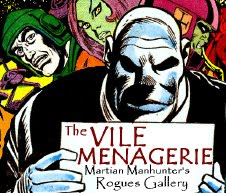


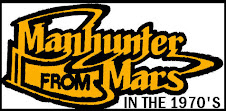
















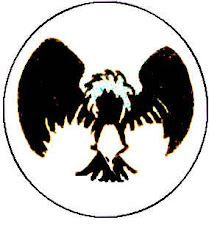




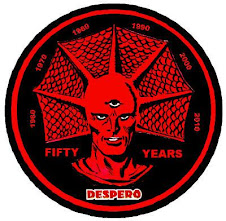
4 comments:
Triumph could be a good counterpoint to J'Onn but it would take some effort to work him into the new continuity. For J'Onn, I think he saw in Triumph the sense of entitlement that he might have seen in Commander Blanx.
As for Effigy, I voted against him.I do not see much use for a character who only interacted with J'Onn rarely.
I remembered that, Will. You came down viciously on Effigy. We were just on the wrong side of a majority that should offer an explanation in the comments, consarnit!
Frank, I have a rule. If I take a stand, I explain it.
As for Triumph, it seems that the only stand he really took was for himself. As a telepath, I am sure that J'Onn knew this about Triumph and saw how dangerous he would become.
While the DCnU is reviving Vibe, I am not sure that reviving Triumph would add much. Thrown in a mental association with a certain insult dog puppet, and it might not work. Still, in Triumph's personal story, J'Onn was someone who was an antagonist. In many ways, they are opposite. J'Onn, particularly in the new 52, looks after humanity's interests not caring if he gets public acclaim. Triumph is a glory hog and his good deeds seem to come as a side effect of his trying to be viewed as a hero. (There is also a similar theme with Booster Gold, who came to our time to seek fame but ultimately became a heroic figure.)
Your Triumph-as-villain argument is improving. You've got my vote.
Post a Comment